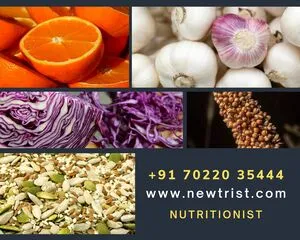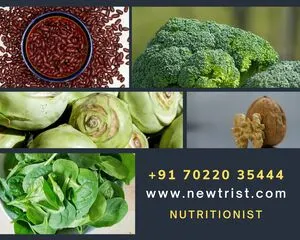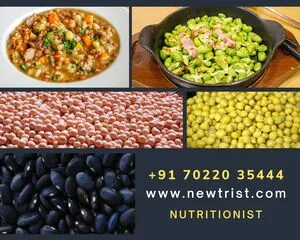The top 5 tips for diabetes diet involve choosing the right foods to gain control over blood sugar levels and avoiding the risk of obesity and cardiac problems.
Tip 1: Watch your calories
- Steer clear of sweet and salty foods, fried foods, fatty foods, and refined foods that make the way for diabetes.
- Include plenty of fruits, vegetables, lean protein, healthy fats, and low-fat dairy to keep your high blood sugar levels at bay.
Tip 2: Complex carbohydrates
- Complex carbohydrates take more time to digest and a slow rise in blood sugar levels can be observed.
- Focus on foods that contain more complex carbohydrates like whole grains, millet, and foods rich in fiber rather than simple carbohydrates found in refined foods.
Tip 3: Mediterranean diet
- The Mediterranean diet is full of healthy foods like fruits, vegetables, legumes, whole grains, nuts, seeds, olive oil, chicken, and fish with the exclusion of unhealthy foods like processed and red meats, sugars, and saturated fats.
- Following the Mediterranean diet can keep your sugar levels under control.
Tip 4: Acidic and Alkaline diet
- Acidic foods like sugars, wheat, and meat consumption can increase the acidic nature of the body and may lead to gastric issues.
- Vegetables and seeds can make the body alkaline which helps you to lose weight and be on the healthier side.
Tip 5: Raw foods
- Raw foods like fruits, vegetables, nuts, and seeds can be the best choice for snacking and morning drinks.
- Raw foods retain their nutrients which may be lost during the process of cooking.
- Raw foods are high in fiber and keep you satiated for long hours which controls the increase in blood sugar levels and insulin levels. It also aids in weight management.
Best Nutritionist in Bangalore
Consult 19-year-experienced Chief Nutritionist Vasanthi, in person at HSR, Koramangala, Bellandur, Haralur, Electronic city, or online across India.

Table of Contents
Can insulin resistance be reversed?
Insulin resistance can be reversed with dietary modifications and lifestyle changes.
- Concentrate on your food habits – Choose high-fiber foods and protein-rich foods to improve your insulin sensitivity and overall health. Consuming whole grains, complex carbohydrates, and insoluble fibers can lower insulin resistance by lowering blood sugar levels.
- Avoid simple carbohydrates and sugars – Upgrade your food habits to healthier ones. Simple carbohydrates and sugars can cause blood glucose levels to shoot up immediately after consumption.
- Physical activity – Regular physical activity can help in improving insulin sensitivity. The more calories you burn, the more sugar that has been stored is used in the form of glycogen in the liver. Exercise of moderate intensity can boost glucose uptake by at least 40% in a single session.
- Improved sleeping patterns – Improved sleeping patterns can improve insulin sensitivity. Lack of enough sleep stimulates the body to produce more Cortisol, a stress hormone that worsens insulin resistance. Follow a good sleep routine to increase your body’s insulin sensitivity.
- Antioxidant-rich diet – Inflammation may result from insulin resistance. Eating a diet rich in antioxidants helps in reducing inflammation.
- Reducing extra weight: Our nutritionists assist you to lose weight and address insulin resistance. A 7% weight loss can delay the onset of Type 2 diabetes by 58%.
These changes in lifestyle over time can:
- Enhance the sensitivity of insulin (reduce insulin resistance).
- Reduce your blood sugar levels.
- Bring down blood pressure.
- Lower the levels of LDL (“bad”) cholesterol and triglycerides.
- Elevating HDL (“good”) cholesterol levels.

What are the benefits of Amla for diabetes mellitus?
- Amla for Diabetes Mellitus is used as a conventional treatment in preventing pancreatitis. Eating amla after a meal can prevent spikes in blood sugar levels.
- Inflammation of the pancreas can harm the cells that secrete insulin and cause a deficiency in insulin which may lead to raised blood sugar levels.
- The chromium content present in amla aids in the regulation of carbohydrate metabolism and increases insulin sensitivity, thus maintaining blood sugar levels.
- Amla is a rich source of vitamin C, a potent antioxidant that is well-known for its health benefits.
- Oxidative stress may be one of the reasons for diabetes. Amla is capable of reversing the adverse effects of oxidation and improving the symptoms of diabetes.
- Drinking amla juice may help address some health issues that are common in persons with type 1 diabetes mellitus.
- Consuming amla fruit powder significantly reduced both fasting and post-meal blood glucose levels in individuals with and without diabetes, suggesting that the Indian gooseberry may be a beneficial diabetes management tool.

What foods can cause diabetes?
Diabetes is a health disorder where the sugar level increases in the bloodstream due to the insufficiency of insulin. The genetic and environmental factors join hands in the progression of the disorder.
The majority of the food we consume is converted into sugars, commonly known as glucose, and then released into the bloodstream.
When there is a rise in blood sugar after the meal, the brain stimulates the pancreas to produce insulin to manage the blood sugar levels.
Focus on fiber-rich foods and healthy protein sources to prevent the build-up of sugar in the bloodstream.
Highly processed carbs
- Foods that are refined lose their fibers and become high in carbohydrates which can cause a drastic change in the blood sugar level.
- Polished rice, white sugar, refined flour, and products made from them like white bread, cakes, cookies, pastries, noodles, and pasta contain high amounts of processed carbohydrates.
- These foods are high in calories (empty) and sugars with very few nutrients. Nutritionists and doctors advise avoiding these kinds of foods as much as possible.
- Highly processed foods digest easily and get absorbed in the bloodstream causing sugar levels to spike. These foods increase the risk of type 2 diabetes by 21%.
- Limit the intake of processed foods like cakes, muffins, bread, pasta, and bakery items and opt for healthy food choices like whole grains and freshly-produced vegetables.
Sugary Drinks
- Sugary drinks like sodas, sweetened fruit juices, coffee and tea with added sugars, milkshakes, and energy drinks contain too much sugar which increases the risk of type 2 diabetes.
- Consumption of too many calories can result in weight gain and an increase in insulin sensitivity occurs with the intake of high amounts of sugary foods.
- The risk of type 2 diabetes increases by 26% with the daily consumption of one or more sugary drinks versus less than one sugary drink per month.
- Substitute plain water, probiotic drinks, and detox drinks for sodas, packed fruit juices, and milkshakes to reduce the effect of sugar in the bloodstream. Water can provide your body with many health benefits.
Saturated and Trans fats
- Saturated fats are found in fried foods, fast foods, butter, coconut oil, full-cream milk, and processed meats. These foods raise the cholesterol level in the blood which can be a major risk factor for diabetes.
- Saturated fats and trans fats can lead to obesity and several other health complications.
- The smart way to avoid saturated fats is to snack on fruits, vegetables, nuts, and steamed foods.
- Avoid salad dressings like mayonnaise and ranch dressing which can be replaced by olive oil and vinegar.
- Refrain from cooking with refined oils and coconut oil and choose healthier options like groundnut oil, sesame oil, olive oil, and mustard oil.
Red and Processed Meats
- Red and processed meats contain high amounts of sodium and nitrates which can deteriorate your cardiovascular health and can put you at high risk of diabetes.
- Processed meats like bacon, hot dogs, sausages, and deli meats are high in saturated fats which can prove harmful to the body.
- Switch on to lean meats like deskinned chicken, sea foods, eggs, and fresh-cut meats for healthier options in the meal plan.
What foods are high in protein for diabetics?
Protein is a macronutrient required for the nourishment of the cell system and weight management. Proteins obtained from plant sources provide the necessary fiber and nutrients.
Plant proteins contain low/no fats which help in the prevention of unnecessary weight gain. Some of the plant sources of proteins to include in the diet are:
- Lentils and split peas
- Kidney beans and black beans
- Chickpeas
- Edamame beans
- Soy products
- Nuts and seeds
Proteins obtained from animal sources may contain saturated fats that may contribute to weight gain. The smart selection of foods helps to avoid the fats from these foods.
- Skinless chicken contains fewer fats when compared to chicken with skin. Skinless chicken offers the best quality proteins for your body.
- Turkey is also a high-protein food with low-fat food. It supplies the best protein and remember not to consume them in fried forms to stay away from the ill effects of bad cholesterol.
- Dairy products like low-fat paneer, low-fat curd, low-fat cheese, and skimmed milk contain considerable amounts of proteins.
- Whole eggs (Boiled)
Seafood and fishes provide additional advantages of proteins for diabetic patients. Include sea foods a couple of times a week to avail the proteins from them.
- Fishes like salmon, mackerel, sardines, and herring are excellent sources of omega-3 fatty acids.
- Crabs, shellfish, prawns, and shrimps are good sources of proteins.

Which foods can cause a spike in blood sugar levels?
Foods that raise blood sugar levels are foods with high amounts of carbohydrates, and fats, foods that contain a high GI, and foods with a low-fiber content.
- Sugary foods
- Potatoes
- Noodles
- Pasta
- Fruits like bananas, jackfruit, and mangoes
- Dried fruits
- Refined foods
- Candies and chocolates
- Foods high in saturated and trans fats
- Bakery items
FAQs
How can I control my diabetes fast?
Shifting to a healthy diet, regular physical exercises, stress management, good quality sleep, and maintaining a healthy weight can help to control your diabetes fast. Limitations of unhealthy food choices such as refined foods, processed foods, and sugary desserts help in managing your diabetes effectively.
What are good tips for diabetes?
· Eat foods rich in fiber and complex carbohydrates to prevent the rise in blood glucose levels.
· Make exercising a daily routine for 1 hour
· Avoid sugary foods and bakery goods that contain good amounts of sugars and additives.
· Avoid polished and refined foods
· Switch to healthier fats found in avocados, fatty fish, olive oil, and nuts
· Choose wisely on snacks
Track your blood sugar levels frequently
What are the 5 rules of diabetes?
1. Be strict with your diet. Focus on healthy food choices like fruits, vegetables, leafy greens, whole grains, nuts, seeds, and lean meats such as skinless chicken, fish, and turkey.
2. Be physically active to maintain your blood glucose levels and burn extra calories.
3. Stay away from sweetened beverages, fried foods, foods rich in simple carbohydrates, and desserts.
4. Set a goal and lose extra weight with healthier choices of foods.
5. Follow your medications.
What can I eat to reduce diabetes?
Healthy foods such as leafy greens, and fiber-rich vegetables such as ladies’ fingers, pumpkin, broccoli, brussels sprouts, whole grains, nuts, seeds, and seafood can reduce diabetes. Drinking bitter gourd juice on an empty stomach in the morning is advised for patients with diabetes. Consumption of seafood is effective in the improvement of blood sugar levels post-meal.